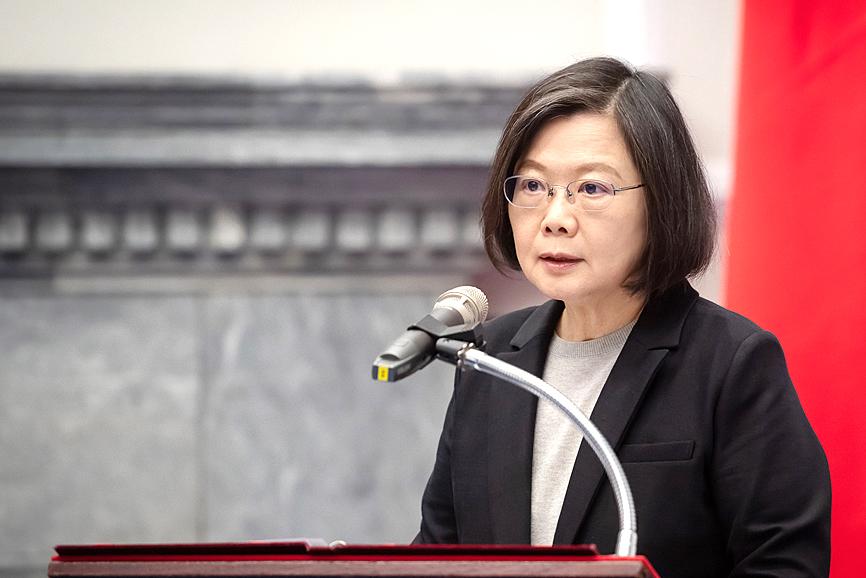President Tsai Ing-wen (蔡英文) ranked ninth on Forbes magazine’s list of the most powerful women in the world, moving up 28 spots from last year’s ranking.
Forbes highlighted that Tsai became Taiwan’s first female and unmarried leader in 2016, and was re-elected last year with more than 57 percent of the popular vote.
The magazine said her re-election was a “rebuke to Beijing’s efforts to control the island.”

Photo: EPA-EFE
Tsai has made protocol-breaking overtures to the US, which has created tensions with China, it said.
Forbes commended her leadership during the COVID-19 pandemic and her efforts in stimulating the economy with initiatives focused on biotechnology, defense and green energy to make Taiwan “an indispensable member of the world.”
Tsai made the list for the sixth-straight year since her first listing in 2016, when she was ranked 17th. Last year, she was 37th.
Advanced Micro Devices (AMD) president and CEO Lisa Su (蘇姿丰), who was born in Tainan and migrated to the US as a child, ranked 49th on this year’s list.
Under Su, who trained as an electrical engineer, AMD’s stock price has risen more than 25-fold, Forbes said, adding that the company made one of the greatest turnarounds in the technology sector in the past few years.
US novelist and philanthropist Mackenzie Scott topped the list, after she in 2019 pledged to give away half of her wealth.
Scott, the former wife of Amazon founder Jeff Bezos, has thus far donated about US$8 billion to more than 500 nonprofit organizations, including US$2.74 billion granted to 286 groups in June, the magazine said.
US Vice President Kamala Harris ranked second, after she early last year was the first black and Asian-American woman to assume the second-highest office in the country, it said.

Taiwan is stepping up plans to create self-sufficient supply chains for combat drones and increase foreign orders from the US to counter China’s numerical superiority, a defense official said on Saturday. Commenting on condition of anonymity, the official said the nation’s armed forces are in agreement with US Admiral Samuel Paparo’s assessment that Taiwan’s military must be prepared to turn the nation’s waters into a “hellscape” for the Chinese People’s Liberation Army (PLA). Paparo, the commander of the US Indo-Pacific Command, reiterated the concept during a Congressional hearing in Washington on Wednesday. He first coined the term in a security conference last

Prosecutors today declined to say who was questioned regarding alleged forgery on petitions to recall Democratic Progressive Party (DPP) legislators, after Chinese-language media earlier reported that members of the Chinese Nationalist Party (KMT) Youth League were brought in for questioning. The Ministry of Justice Investigation Bureau confirmed that two people had been questioned, but did not disclose any further information about the ongoing investigation. KMT Youth League members Lee Hsiao-liang (李孝亮) and Liu Szu-yin (劉思吟) — who are leading the effort to recall DPP caucus chief executive Rosalia Wu (吳思瑤) and Legislator Wu Pei-yi (吳沛憶) — both posted on Facebook saying: “I

Sung Chien-liang (宋建樑), who led efforts to recall Democratic Progressive Party (DPP) Legislator Lee Kun-cheng (李坤城), was released on bail of NT$80,000 today amid outcry over his decision to wear a Nazi armband to questioning the night before. Sung arrived at the New Taipei District Prosecutors’ Office for questioning in a recall petition forgery case last night wearing a red armband bearing a swastika, carrying a copy of Adolf Hitler’s Mein Kampf and giving a Nazi salute. Sung left the building at 1:15am without the armband and covering the book with his coat. Lee said today that this is a serious

Firefighters are working to put out a fire on Taipei’s Yangmingshan (陽明山) reported earlier this morning. The cause of the fire is still under investigation. The Taipei Fire Department said it received a report of a fire at Xiaoyoukeng (小油坑) at 11:17am, dispatching four command vehicles, 16 firetrucks, one ambulance and 72 personnel. The fire is still burning on about 250m² of land, according to initial estimates, as eyewitnesses reported seeing smoke rising from the mountain. The Yangmingshan National Park Headquarters on Facebook said the Qixingshan (七星山) hiking trail starting from Xiaoyoukeng and the Xiaoyoukeng parking lot are closed as firefighters work to put